When someone loves their partner a lot and feels scared of losing them, that fear can sometimes manifest as relationship anxiety.
Every relationship is a little schizophrenic. There is a natural tendency to want to grow closer to the person with whom you have some bond. A desire to draw nearer by sharing one’s thoughts, enjoyments, hopes, and passions.
At the same time, there is a natural tendency to want to maintain distance from that same person. The desire to be independent, avoid vulnerability, remain unburdened, and free.
Both of these inclinations are normal and, when acted on in mature ways, they create a healthy ebb and flow that allows relationships to mature in a steady sure-footed manner.
The push and pull of these forces create something of an interpersonal dance. No, not a congo line, or the macarena.
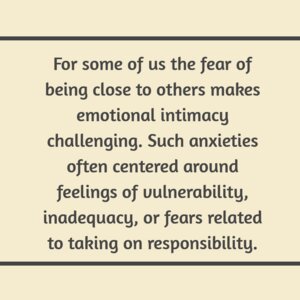
More like what is seen in paired figure skating where the man and woman are together one moment, hand in hand, and in the next moment they are far apart but still connected by a mutual rhythm. Although at opposite ends of the rink they remain connected in moving to the music guided by the same choreographed routine.
What would happen, however, if one of the figure skaters could not maintain that rhythm? What if one member of the team refused to come close to the other? Or on the other hand, refused to be separated from the other? Their performance would suffer. Badly. It might be called “Awkward On Ice.”
Anxiety can easily inject itself into our relationships and create this same sort of problem. For some of us, the fear of being close to others makes emotional intimacy challenging. Such anxieties often centered around feelings of vulnerability, inadequacy, or fears related to taking on responsibility. Very often the response to such feelings is to find ways to gain emotional distance.
These relationships often fail to gain momentum. They falter, lose direction, and eventually die from a lack of deep connection.
Related: Relationship Anxiety: What To Do If You’re Afraid To Lose Her?
A different type of relationship anxiety, that of being abandoned has the opposite effect. This fear may lead one to cling too tightly to others. The independence of their spouse, friend, or even their child, may feel threatening.
Such fears frequently lead one to make intense demands for a partner’s attention, affection, and time. An addiction to constant reassurance develops. The person on the receiving end of these demands can quickly become exhausted. No matter how much effort is put into showing genuine love and commitment, it is never enough.
These sort of relationships break apart under the strain.
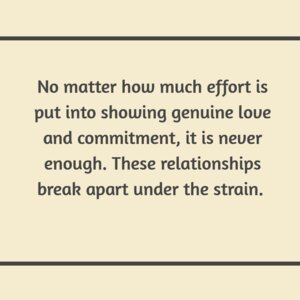
Anxiety has the capacity to crush relationships. What’s more, even when a relationship survives this stress, you can count on it not being as full and rewarding as it would be were anxiety out of the picture.
Keep in mind, the sort of anxiety that we are focused on is specifically related to fears of commitment and emotional intimacy. This is different than social anxiety, panic attacks, phobias, and other anxiety disorders.
Each of those anxieties can have a major impact on relationships, but none of them are specifically in response to fears arising from emotional intimacy. That distinction makes a difference in how anxiety is overcome.
Signs That Anxiety Is Affecting Your Life
You may be wondering whether relational anxiety is creating problems in your life. It can be difficult to know. After all, everyone experiences anxiety to some degree, so how can you know whether it has gotten to the point of impacting your relationships with family and friends.
The following questions may shed some light on whether this is a problem:
1. Do you often worry that your partner will leave you for someone else?
2. Do you trust your partner when he or she is out with friends?
3. Do you frequently require reassurance of your partner’s love and devotion?
4. Do you become extremely anxious at how your partner will respond to a mistake you have made?
5. Are there certain conversations that you avoid having with your partner because you worry that he or she will become angry with you?
6. Are you frequently worried that your partner is being unfaithful?
7. Are you someone who easily becomes jealous?
8. Are you controlling of your partner’s time, needing to know in detail where he or she has been and with whom?
9. Do you resist relying on your partner?
10. Do you feel uncomfortable when you partner emotionally relies upon you?
11. Have a number of individuals said that you are difficult to get to know?
It would be good to have a very honest talk with your partner if you answered ‘Yes’ to five or more of these questions. Discuss your anxieties candidly. Try to understand how your attempts to cope with these fears may be influencing your relationship. After that, work as a team to see how you can make repairs, change how you interact, and strengthen the relationship.
If you would like to get a clearer sense of how anxiety is affecting your life, you can complete a three-minute ‘Brief Anxiety Quiz’ found on the following page.
What You Can Do To Fight Back Against Anxiety
To fight back against anxiety it is helpful to know the three major ways it shows up in your life. Once you understand how it shows up, it is easier to figure out how to make it go away.
Anxiety shows up in three ways – emotions, behaviors, and thoughts.
The emotional aspect is the one that everyone first thinks of when referring to anxiety. It is the worry and fear that gnaw and grow within you when anxiety has started to take root.
Physical symptoms of anxiety include increased heart rate, GI upset, perspiration, fidgetiness, pacing, sleeplessness, and so forth.
The thinking, or cognitive symptoms, vary depending upon the target of the anxiety. In general, however, these thoughts focus on the catastrophic consequences of some yet to occur event.
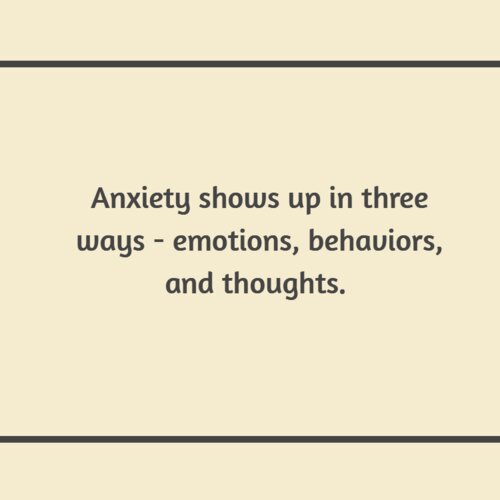
These three facets of anxiety work together. Anxious thoughts give rise to fearful emotions that prompt you to act in certain ways. For example, if a severe storm has arisen, and your spouse is two hours late coming home from work, you may begin to wonder if he or she was in an accident. This thought gives rise to anxiety, which in turn leads you to begin to pace the floor. The thought, feeling, and behavior connect one to another.
Not only do they connect, but they also can begin to reinforce one another in ways that are not at all helpful. They become linked one to another in a pattern.
An example will help demonstrate how this works. Imagine a young couple, Brian and Alicia. They have been together for nearly a year and are extremely happy.
Brian has recently become anxious that he is not progressing fast enough in his career. He would like to marry Alicia, and prior to proposing he wants to increase his income. Brian is determined to be a good provider and feels insecure about his abilities in this regard.
This concern has grown stronger of late, and Brian has become more preoccupied as a result. The thought of “Loser” being etched across his forehead is distracting. Yes, Brian is very hard on himself.
He decides to start to work more hours in order to jump-start his career (although he already works 50 hours a week). Being a shy person, a retiring fellow, he does not tell Alicia. She’ll just ask why and then he would need to tell her about his “Loser” worries and that gets very embarrassing. Nope, he’ll just take care of this in his own way on the down-low.
Over the next several weeks Alicia frequently wonders why Brian is so distracted whenever they are together. She also begins to feel a little neglected because he is spending so much time at work. “Weird,” she thinks to herself.
Without having heard why Brian is distracted or working extra hours, Alicia has no context for understanding these changes. She assumes it must be due to his no longer finding her attractive or interesting. Alicia begins to worry about Brian’s commitment to their relationship. She would love to talk to Brian about her worries but does not want to risk being told that her suspicions are correct. That would be devastating.
Instead, Alicia decides to do a little dialing back of her own and emotionally withdraws.
As time goes by Brian assumes that Alicia’s being less attentive and affectionate is a sign that she needs more time to herself. He thinks “Perhaps I’ve pushed her too fast” and decides that he needs to respect her need for distance. He can do this by working more at the office and not bothering her by making too many demands on her time.
Of course, Alicia believes that Brian’s backing off in this way is a confirmation of his lack of interest (or self-absorption). Her anxiety and resentment grow even stronger.
She begins to wonder whether she should end the relationship before getting hurt even worse. We can see how this cycle deepens and expands as time goes on.
Related: What Your Anxiety Makes Relationships And Dating So Hard
If we were to diagram this interaction it would look like the following:
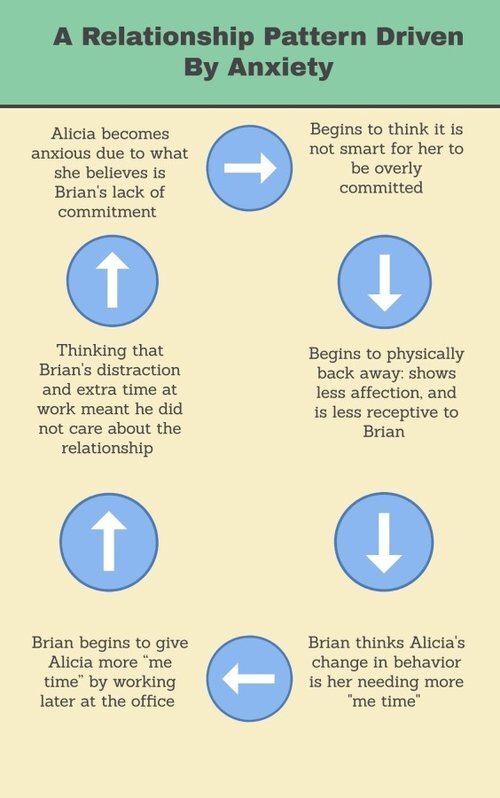
Breaking The Anxious Pattern
Let’s look at how this sort of pattern can be changed so that happier, healthier relationships can be formed.
We’ll start with a brief one-question quiz:
The key to breaking free from this sort of destructive anxiety is:
A. Visiting a psychoanalyst five days a week, laying on the couch, and saying whatever comes to mind
B. Burning incense, chanting, drumming, eating a strictly vegan diet for six months, and wearing paisley print bell bottoms
C. Using a combination of clear communication and corrective experiences.
The answer, get ready for it…… “C.” Clear communication was the giveaway, right? Absolutely. Had Brian or Alicia been clear about what they were thinking, the situation very likely would never have spiraled downward.
But, it is worth noting that there are some people wherein clear communication would not be enough to save the relationship. This occurs when one, or both partners, have unusually intense fears about being in an intimate relationship.
The anxiety is so deeply rooted that even with good communication the fear remains. It is similar to talking to someone with a fear of flying and telling him or her about the exceptional safety record of air travel.
The information may be clear, accurate, and even accepted at an intellectual level. But at the gut level, that person just knows the plane he or she happens to fly on is surely going to fall from the sky and crash.
Something more is needed in order to help that person get over the fear of flying.
Corrective Experiences As The Key To Change
This is where corrective experiences are essential in order to break the anxious patterns we’ve been discussing. A corrective experience is one that strategically pushes back against some compelling fear. It corrects a lie, heals a distortion. The experience, to be corrective, needs to refute the very foundation upon which the anxiety remains alive in one’s life.
These foundations are always built upon falsehoods. “No one could genuinely love me if they knew the real me.” “People think I’m successful but that is only a façade – if they could see the truth it would reveal that I’m an imposter.” “If I let that person into my life and things don’t work out I would be totally devastated.”
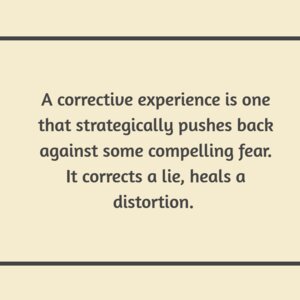
The corrective experience powerfully refutes such lies. Not through thought, but through action. It is one’s immersion in the experience that gives it power.
Let me elaborate. Using the fear of flying example again, a corrective experience would be one in which the person got on an airplane, remained relatively calm throughout the flight (no screaming, no rolling in the aisle, no hanging onto the stewardess as though she were a teddy bear), and safely landed.
The person would have experienced safely, and calmly, flying in an airplane. The lie of “If I get on that airplane I’m going to crash and die” has been experienced as being false. Score one for truth, and a step forward in being rid of the fear of flying.
To thoroughly diminish that anxiety, however, that corrective experience would need to be repeated over a period of time and in various settings. In this case, the person would need to take other flights, both short and long duration, with companions and solo, leaving from various airports.
The idea is to so thoroughly beat down the anxiety with multiple corrective experiences that it is no longer an active force in one’s life. That is freedom.
Related: 7 Signs Of A Dysfunctional Relationship You Must Look Out For
Corrective Experiences For Brian And Alicia
For this young couple, corrective experiences would require them to have behaved much differently. With regard to Brian, it would mean talking with Alicia about his insecurities rather than hiding them. It would also mean not rushing off to put in more hours at work simply to ward off his sense of inadequacy (this assumes he really was already working diligently to advance in his career).
Alicia’s corrective experiences would involve discussing her fear that Brian was no longer committed to the relationship rather than avoiding such discussions. If her anxiety persisted even after being reassured, she would need to continue to be fully engaged and attentive within the relationship. This is directly opposite from the reaction she had which was to back off from involvement.
If both Alicia and Brian continued to behave in ways that were the opposite of how their fear pushed them to act, their anxiety would eventually lessen. In time, with repeated corrective experiences both of them would be able to break the stranglehold of relational anxiety.
When that took place, they would find a sense of freedom, and interpersonal connectedness, that they had never known before.
How To Use This Information
The key to making use of Brian and Alicia’s story is to make an honest appraisal of your own fears, anxieties, and responses to forming close intimate relationships. Write these down and then proceed to consider how realistic each of these fears is in your current relationship.
At this point, it can be helpful to have a friend or counselor look at the list with you and provide their opinion about how realistic these items appear to be.
Now choose those fears that are clearly unrealistic and also appear to be major stumbling blocks that get in the way of developing a more satisfying relationship. Take some time to think about what corrective experience would act as a good first step in refuting this fear?
Don’t rush this part, but take your time. Come up with several things you could do and be as specific as possible. Then select one, and move forward with putting that experience in your life. Just as in the example above, Brian would have needed to speak with Alicia about his insecurities regarding his ability to provide. He then would have needed to refrain from spending even more time at work.
That is the sort of practical and ‘real world’ experience that is required to provide a corrective experience. Don’t settle for something less. Corrective experiences initially create anxiety. That’s one of the reasons they are ‘corrective’ because you have faced something you fear. If the experience you have decided upon does not cause you to be anxious, then it probably is not very closely connected with your relationship anxieties.
In that case, it is unlikely to provide you much help. Do something that requires mustering a degree of courage. Then you’ll know that you are on the right track.
Summary
Anxiety can be a relationship killer. Even if a relationship remains intact in the face of such fears, it will never develop to its full potential. Whether it be a relationship with your spouse, children, friends, or siblings, anxiety is your enemy.
Don’t give in. Don’t get comfortable living with such fears. Instead, identify how you have been unintentionally accommodating this fear and then do the opposite. Provide yourself with corrective experiences that push back against the fear and provide you with the freedom to make the most of every relationship.
One place to start is using the information we’ve just reviewed. Or, if you are in the Folsom area you might think of joining a support group. In addition, therapy can be very effective. My colleagues and I would love to be of help, but if you are looking for other sources of support in or around the Folsom California area, it may be that Valley Psychological Center or The Place Within might be of interest.
If you struggle with relationship anxiety don’t delay tackling the problem. Once you begin to make changes you’ll realize that it is easier to solve than you had thought, and life is far more fulfilling than you could have imagined.
Written By Forrest Talley
Originally Appeared In Forrest Talley
A healthy amount of relationship anxiety can sometimes be a good thing because it shows that your feelings are genuine for your partner, and you would not want to lose them. But if your relationship is constantly plagued with anxiety, then you need to stop and think about what you can do about it. Anxiety cannot be a permanent part of your relationship.
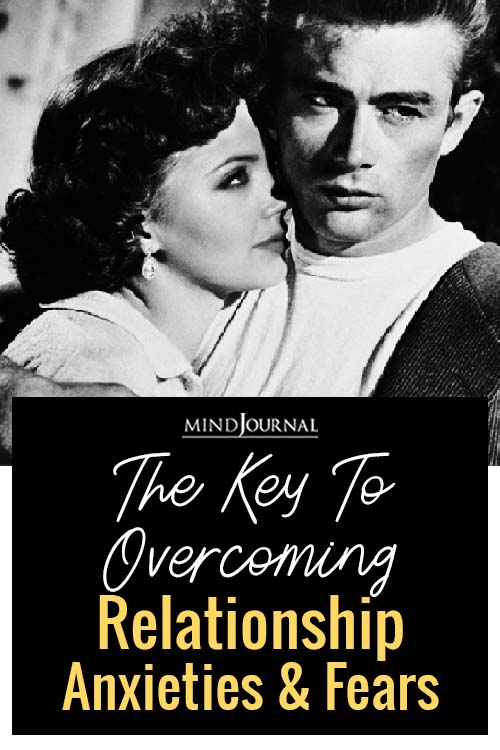









Leave a Reply